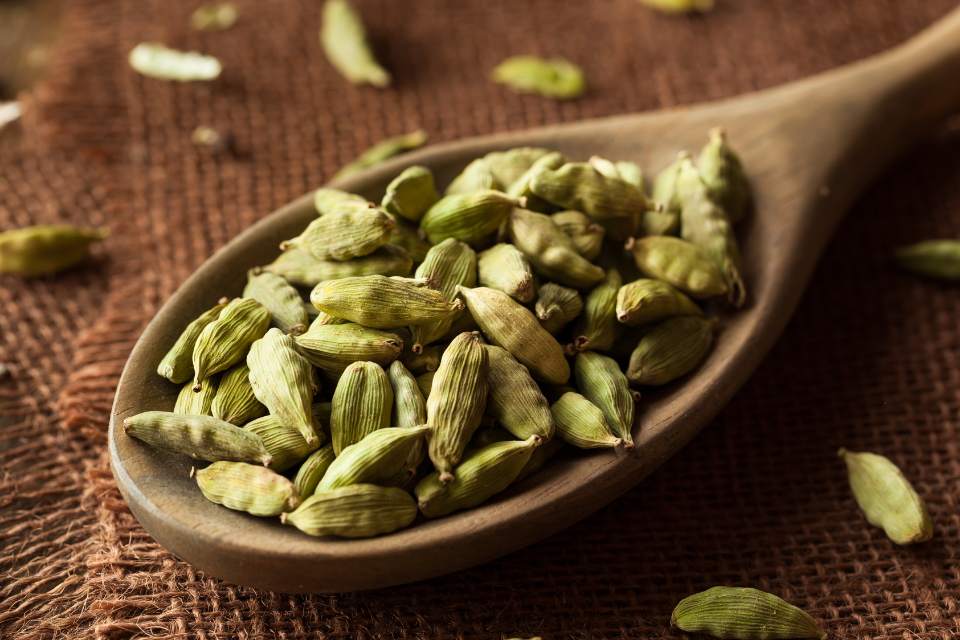
Cardamom is a spice made from the seeds of several plants in the genera Elettaria and Amomum in the family Zingiberaceae (the ginger family). It’s known for its strong, unique flavor and aroma, which is often described as sweet, spicy, and slightly floral.
Cardamom is primarily grown in tropical regions, with major producers being India, Guatemala, and Sri Lanka.
Types of Cardamom
- Green Cardamom (Elettaria cardamomum): The most common type, often used in sweet and savory dishes, as well as in teas and coffees.
- Black Cardamom (Amomum subulatum): Has a smokier, more robust flavor and is typically used in savory dishes, particularly in Indian cuisine.
Cardamom offers several health benefits, thanks to its rich array of bioactive compounds. Here are some of the key health benefits associated with cardamom:
1. Digestive Health
- Relieves Indigestion: Cardamom can help alleviate indigestion and bloating. It stimulates the secretion of digestive enzymes, enhancing digestion.
- Anti-spasmodic Properties: Can relieve stomach cramps and spasms.
- Aids in Nausea: Traditionally used to combat nausea and vomiting.
2. Oral Health
- Natural Breath Freshener: Chewing cardamom seeds can help freshen breath.
- Antimicrobial Effects: Its antimicrobial properties may help fight oral pathogens and reduce cavities and gum disease.
3. Anti-inflammatory and Antioxidant Properties
- Reduces Inflammation: Compounds in cardamom have anti-inflammatory effects that can help reduce inflammation in the body.
- Protects Cells: Rich in antioxidants, cardamom helps neutralize free radicals, protecting cells from damage and reducing the risk of chronic diseases.
4. Cardiovascular Health
- Lowers Blood Pressure: Some studies suggest that cardamom may help lower blood pressure, possibly due to its diuretic effect and ability to relax blood vessels.
- Improves Circulation: Can improve blood circulation, which is beneficial for heart health.
5. Metabolic Health
- Regulates Blood Sugar: Cardamom may help control blood sugar levels, beneficial for managing diabetes.
- Aids in Weight Loss: Some research indicates that cardamom may boost metabolism and aid in fat loss.
6. Respiratory Health
- Relieves Respiratory Issues: Used in traditional medicine to relieve coughs, colds, and bronchitis. It can help improve airflow to the lungs.
- Anti-asthmatic Effects: May help alleviate asthma symptoms by relaxing the airways.
7. Detoxification
- Liver Health: Cardamom can support liver function, helping in detoxifying the body.
- Kidney Health: Acts as a diuretic, promoting kidney health and helping to eliminate toxins.
8. Mental Health
- Mood Enhancer: The aroma of cardamom is said to have mood-enhancing properties, potentially reducing anxiety and stress.
- Cognitive Function: Antioxidants in cardamom may support brain health and cognitive function.
9. Antimicrobial and Antiviral Properties
- Fights Infections: Cardamom has antimicrobial and antiviral properties that help fight various infections.
10. Cancer Prevention
- Potential Anti-cancer Properties: Preliminary research suggests cardamom may have compounds that inhibit cancer cell growth, particularly in colorectal cancer.
Usage and Precautions
- Moderation: While cardamom is generally safe for most people, it should be consumed in moderation.
- Allergies: Some individuals may be allergic to cardamom.
- Interactions with Medication: If you are taking medication, especially for heart conditions or blood pressure, consult with a healthcare provider before adding large amounts of cardamom to your diet.
 Daryeel Magazine
Daryeel Magazine




